Paris Programme
Saturday, 29 November 2025
Today, Rencontres Internationales Paris/Berlin invites you to Studio Bastille for two screenings and a round table discussion at 1 pm, 3 pm and 5 pm, with free admission. There will also be two special screenings at the Cité internationale des arts at 6 pm and 8 pm, also with free admission.
Screening
Studio Bastille
2 ter Place de la Bastille - 75012 Paris / Metro: Bastille, lines 1, 5 and 7
Free admission for all, subject to availability
Professional accreditation and youth badges: free priority access subject to availability
"Strange Communities"
Kevin Sepp : Goodbye Regina - Experimental doc. | 16mm | | 8:48 | Germany | 2025
Kevin Sepp
GOODBYE REGINA
Experimental doc. | 16mm | | 8:48 | Germany | 2025
The Italian Alpine region of South Tyrol is not known for its tuning scene, but it does exist. A small group of young men have found each other to express their love of their home in their own way. Their Japanese sports cars glide oddly through historic villages, along the Alpine slopes and through breathtaking nature. GOODBYE REGINA is a farewell letter from the director to his grandmother, who grew up in these mountains. It explores the connection between the old and the new, without juxtaposing the two. In a landscape where seemingly nothing changes, the machines seem to be part of the creatures that emerge from this nature. The result is some kind of nature documentary, a collection of impressions away from the tourist postcard images.
Kevin Sepp is a director and editor based in Berlin. Coming from a humanities background, he is a self-taught filmmaker whose interest in short, visually rich storytelling led him to work in commercial film. Alongside commissioned projects, he continues to explore new possibilities through independent work. Collaborations with musicians and other artists strongly influence his sense of sound on screen and shape the atmosphere of his work. His films have been featured at festivals such as the Berlin Commercial and Berlin Music Video Awards, as well as on platforms like Directors’ Library, Sleek Magazine and Crack Magazine.
Steve Hawley, Steve Dutton : Midville - Experimental doc. | mp4 | color | 13:20 | United Kingdom, Slovenia | 2025
Steve Hawley, Steve Dutton
Midville
Experimental doc. | mp4 | color | 13:20 | United Kingdom, Slovenia | 2025
‘Midville’ was the pseudonymous name given to a Midlands Art School in the United Kingdom when it was studied over a period of three years from 1967 by two sociologists. The resulting book, ‘Art Students Observed’, published in 1973 has become a classic document within art teaching literature, the place where “romantic” and “conceptual” art first collided. 58 years later I traced the students in the book and interviewed them about their recollections and (sometimes traumatic) experiences. We have recreated ‘Midville’ as a 13-minute AI supported mini collage ‘opera’, where the students as they were then and now, pronounce their testimonies via AI voices, choirs, avatars, and real-world original footage.
Steve Hawley is a Ljubljana based artist who has been since 1981 part of the second wave of British video artists. His work deals with language, humour, and the nature of memory through archive film and video, and has been shown at video festivals and broadcast worldwide. Work on myth and the city includes Ghost made in Hong Kong, screened at the 2000 Cannes Director's Fortnight. War Memorial 2017 was nominated for best short documentary at the Sheffield DocFest and his book, Men, War and Film, about the Calling Blighty message films of WWII was published in 2022. Steve Dutton is an artist and occasional curator based in the South West of England. His practice spans drawing, sound, moving image and text, with a focus on exploring the intersections and overlaps of language, space, and time. He is currently developing a new solo body of work titled "The Phantom Industry." His work engages with the acts of reading, drawing, painting, speaking and writing and might be best described as a language-based practice.
Arthur Debert : La Conférence Des Instruments Savants - Experimental video | 4k | color | 9:1 | France | 2024
Arthur Debert
La Conférence des Instruments Savants
Experimental video | 4k | color | 9:1 | France | 2024
In a wooden amphitheatre built in 1933 for the study of animals and plants, a group of ancient tools attend a lecture. The talk seems to be about animals and their movements, but the tools gradually come to understand that it’s about the living beings that have given them their names and sometimes even their shapes.
Born in Paris in 1990, Arthur Debert lives and works between Nancy and Berlin. Arthur Debert’s protean practice is rooted in collective work and exchange. Anchored in a contextual approach, his work takes shape through travel, encounters and multiple collaborations. Central to these exchanges is the question of the transmission and survival of knowledge. Objects encountered in the field are seen as both witnesses and bearers of epistemological narratives to be deciphered. To reveal the different cultural layers sedimented within them, the artist disrupts their temporal linearity through shifting spatial settings and collective activations. Installations, videos and editions then fix the ephemeral, indeterminate state of the resulting lived experiences. Arthur Debert is a graduate of the École de l’Image in Épinal (2011), the École Supérieure d’Art de Lorraine in Metz (2013) and participated in the École Offshore in Shanghai (2014-2015), a research program of the École Nationale Supérieure d’Art et de Design in Nancy. His work has been shown at Centre Dürrenmatt Neuchâtel (2025), Triennale de la Jeune Création (Luxembourg, 2013 and 2021), Koraï (Cyprus, 2023), Ann Arbor Film Festival (Michigan, 2022), Berlin Art Prize (2018) and Berlin Independent Film Festival (2023).
Jinjoo Yang : Coming Home - Video installation | 4k | color | 12:57 | Canada | 2024
Jinjoo Yang
Coming Home
Video installation | 4k | color | 12:57 | Canada | 2024
The film moves through the hidden storage spaces of the Montreal Museum of Fine Arts, revealing artworks whose ownership records remain incomplete. Some bear traces of wartime displacement and intentional omissions; others have shifted in attribution, altering the narratives attached to them. It traces how institutional structures shape what becomes visible and what remains unresolved. As the camera moves through the storage rooms, “Coming Home” observes the museum as an active system of organization, where artworks are continually recontextualized. Viewers encounter the collection as an unseen archive and are asked to navigate a place where certainty is partial and orientation never fixed.
Jinjoo Yang is a Montreal-based artist and architect whose films emerge from direct engagement with specific sites. She works with institutional interiors, using controlled camera movement to trace how places hold and mediate their histories. Her practice moves between observation and construction, turning regulated environments into temporal landscapes where visibility, authorship, and memory subtly shift. Yang’s recent works include “Coming Home,” filmed in the collection storage of the Montreal Museum of Fine Arts, and “Occupied,” a forthcoming film shaped by Cold War infrastructures. Her projects have been presented internationally at institutions such as the Montreal Museum of Fine Arts, the Center for Architecture in New York, and the Royal Danish Academy of Fine Arts in Copenhagen.
Mladen Bundalo : Every Time You Leave, You Are Born Again - Documentary | mp4 | color | 25:0 | Bosnia & Herzegovina, Belgium | 2025
Mladen Bundalo
Every time you leave, you are born again
Documentary | mp4 | color | 25:0 | Bosnia & Herzegovina, Belgium | 2025
The hypnotic and purring sound of a bus engine resonates, accompanied by the rumble of the vehicle's interior. The voice, close and intimate, leads us into an inner monologue. We are on our way to Prijedor, the author's hometown in Bosnia and the place of his perpetual departures. Before arriving there, we must first learn to inhabit departure as a space in which we can grow and be reborn.
Mladen Bundalo (born in 1986, Prijedor) is an interdisciplinary artist, filmmaker, and author of Bosnian origin, currently based in Brussels. His essay-films explore themes of belonging and the human condition in the context of migration, diaspora, and periods of uncertainty and crisis.
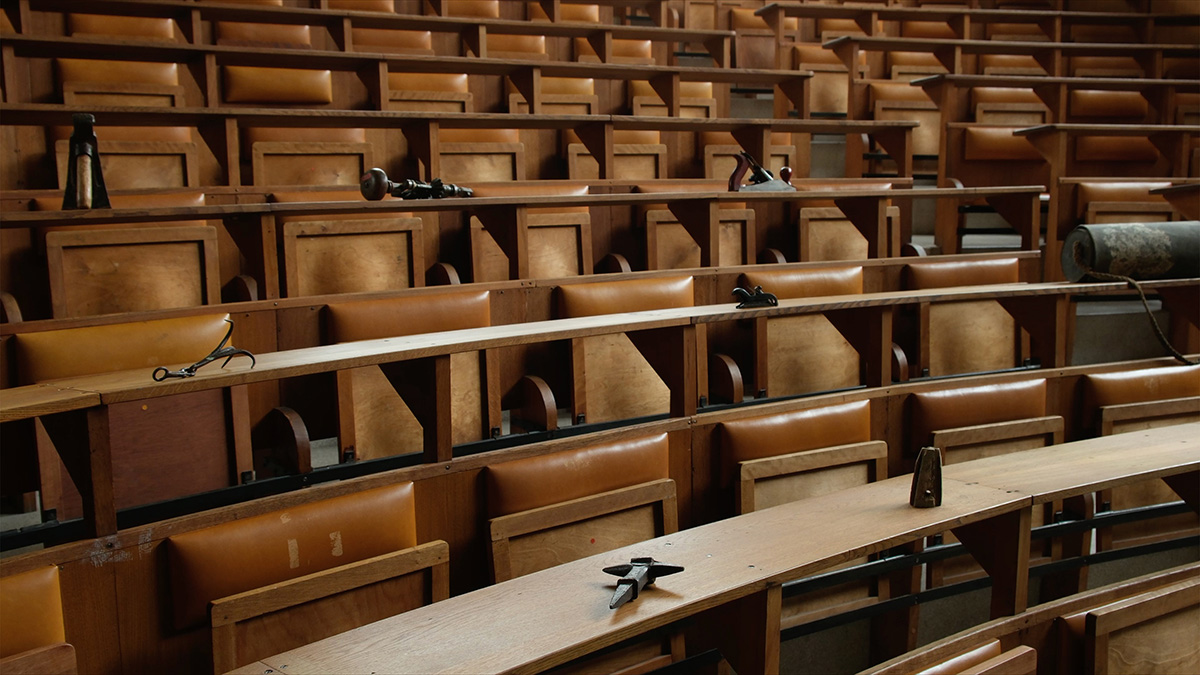
Kevin Sepp films a group of young men in sports cars driving through the alpine landscapes of Tyrol. Steve Hawley and Steve Dutton interview former students of Midville, an art school in the United Kingdom that became the global centre of conceptual art in its early days. Arthur Debert films a 1930s wooden amphitheatre for the study of animals and plants, where a group of ancient tools attend a lecture. Jinjoo Yang reveals the hidden spaces of the Montreal Museum of Fine Arts' storage rooms, examines how institutional structures shape visibility, and questions how narratives around works of art are shaped by acts of omission and reclassification. Mladen Bundalo questions the archetype of separation—leaving home and native land, and the need to return and question from a new position, as a member of the diaspora.
Screening
Studio Bastille
2 ter Place de la Bastille - 75012 Paris / Metro: Bastille, lines 1, 5 and 7
Free admission for all, subject to availability
Professional accreditation and youth badges: free priority access subject to availability
"Trembling Houses"
Pierre-jean Giloux : Biomimetic Stories # 3. Dholera - Experimental fiction | 4k | color | 7:0 | France | 2024
Pierre-jean Giloux
Biomimetic Stories # 3. Dholera
Experimental fiction | 4k | color | 7:0 | France | 2024
Dholera reveals the dystopian vision of this eponymous city, envisioned in the desert-like landscape of the Indian state of Gujarat. The city’s vast network of highways, elevated railways, electric pylons and water towers extend as far as the eye can see on an arid terrain devoid of vegetation, swept through by dust whirlwinds. This vast urban project— for which ground was broken over a decade ago—has now come to a virtual standstill. In-situ footage captured via drone reveals the enormity of this unfinished project through the virtual implantation of certain symbolic buildings featured in the initial project, through the use of point clouds. The ghost of Dholera city is brought forth through the film; a phantom construction site where future ruins create cracks in the very idea of utopia.
Pierre Jean Giloux, born in 1965, was awarded the Villa Kujoyama residency in Kyoto in 2015 and received the Grand Prix for Video Art at the Côté Court Festival in Pantin in 2016. Working in a form of augmented reality, he presents his installations in museums and art centres such as the Museum of Botany in Brussels, La Criée – Centre for Contemporary Art in Rennes, the Barbican in London, the Hiroshima MoMA and the National Museum of Osaka in Japan, as well as in galleries including DNA (Berlin), Sophie Scheidecker and Christophe Gaillard (Paris), Cristina Guerra (Lisbon) and Bank MABsociety (Shanghai). His works are held in private collections (in Paris, Rennes, Brussels and Tokyo, as well as the Pierre Darier Collection in Switzerland and the An-Sammlung in Munich) and in public collections (Fonds d’art contemporain – Paris Collection and the City of Marseille).
Thomas Leon : To Ashes - Video | 0 | color | 5:6 | France | 2025
Thomas Leon
To Ashes
Video | 0 | color | 5:6 | France | 2025
To Ashes explores the thresholds between reality and machinic hallucination, questioning contemporary image-generation technologies — particularly artificial intelligence — and their influence on our perception of the real. Created through a hybrid process combining 3D modeling and AI-based generation tools, the video unfolds as a continuous tracking shot through a brutalist megastructure in constant transformation. Architectural forms disintegrate and transform, while ash-like particles rise into the air. This disintegration is accompanied by an experimental soundscape, where analog synthesizers and transformed voices evoke a latent collapse. Gradually, the architecture gives way to unstable crystalline structures. Reality wavers. In the end, something gives way, shifts, disappears. Everything must burn.
Thomas Léon develops his practice by merging cinema, graphic arts and images from new technologies. He creates films, immersive video and sound installations, as well as large-format drawings. His work explores the interconnections between memory, sensuality, intimate experiences, and the imaginary, drawing on fictions, whether they be social, urban, climatic, etc. He is notably influenced by science fiction and utopian literature and frequently develops his projects using contemporary image creation tools (3D modeling, AI, etc.). He regularly participates in screenings or exhibitions in France and abroad: 'Listening to Transparency' at the Minsheng Art Museum in Shanghai (China, 2017), 'Cruces Sonoros: Mundos Posibles' at the MAC in Santiago de Chile (Chile, 2016), 'Rendez-vous 11' at the Institute of Contemporary Art in Villeurbanne (France, 2011), and at the South African National Gallery in Cape Town (South Africa, 2012). He notably took part in residencies : Drawing Factory organized by CNAP (National Center for Visual Arts) and the Drawing Lab (Paris) in 2021 ; a residency in Taiwan, organized by Grame, the National Center for Musical Creation (Lyon), and the Digital Art Center (Taipei) in 2011. His works can be found in the collections of CNAP (National Center for Visual Arts) and the Louis Vuitton Foundation. Thomas Léon lives and works in Montreuil.
Liliia Filina : Inner Immigration - Experimental film | 35mm | color | 3:36 | Russia | 2025
Liliia Filina
INNER IMMIGRATION
Experimental film | 35mm | color | 3:36 | Russia | 2025
In a nameless Eastern European city, few young people, finds themself trapped between silent resistance and passive complicity as their country descends into war. The city’s streets, once familiar, become a landscape of fear. Shot in stark, observational style, Inner emigration is a haunting portrait of a generation suspended in stillness, forced to navigate a crumbling reality that no longer offers clear choices.
Lily Filina is an artist and director, born in Kaluga, Russia, 1999. A graduate of the Rodchenko Art School, class of Sergei Bratkov, she works as an advertising director and develops independent projects at the intersection of cinema and video art. In 2024, Liliya's film participated in the program of the Rotterdam Film Festival. In 2024, Liliya's project "Internal Emigration” was supported by the Yandex360 program.
Melanie Manchot : Line Of Sight (the Tower) - Video | 0 | color | 12:7 | Germany, Switzerland | 2025
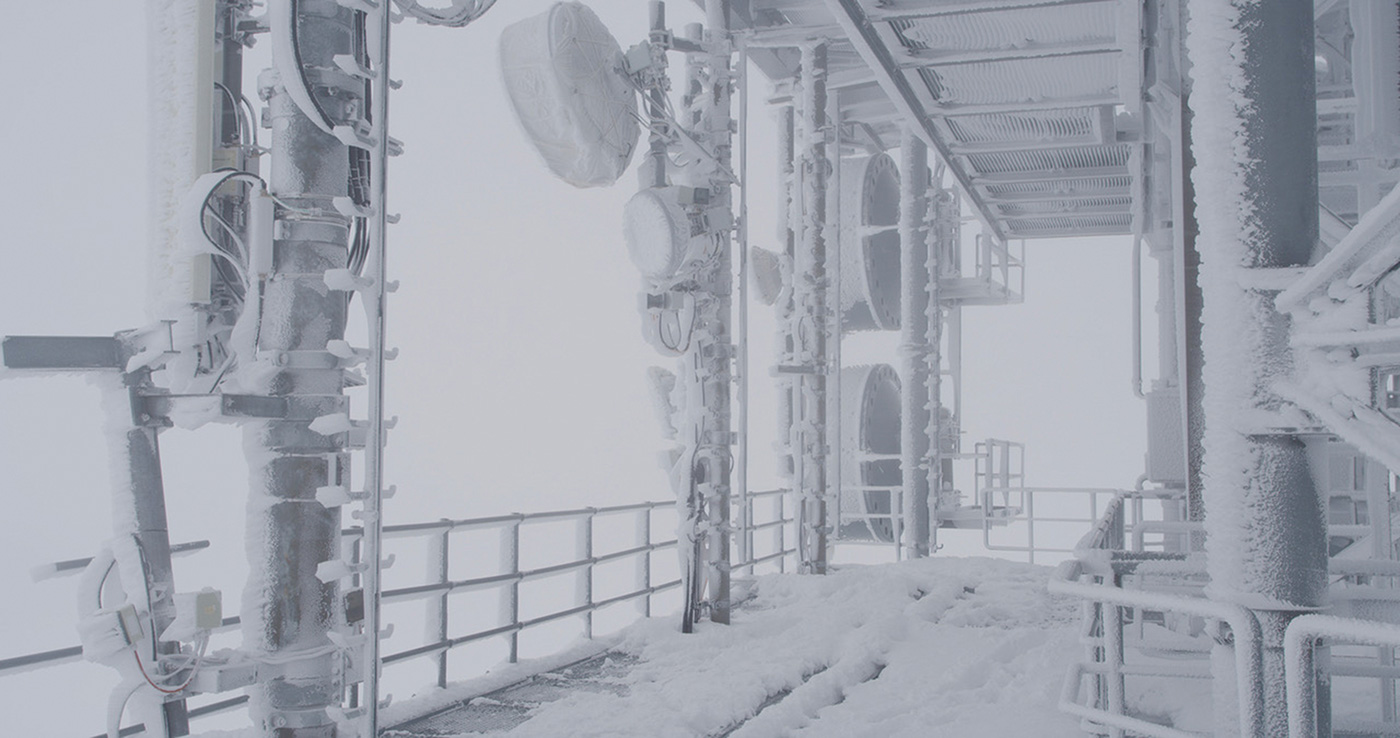
Melanie Manchot
Line Of Sight (The Tower)
Video | 0 | color | 12:7 | Germany, Switzerland | 2025
Filmed in a decommissioned telecommunications tower, which used to house secret military equipment, this work returns to my ongoing investigation of mountains and their architectures as spaces of human-nature entanglements. It also returns more specifically to the alpine village of Engelberg, where I have been making work since 2010. In Line of Sight the camera investigates a deserted structure, a space left behind. As if everyone had vacated in mid-action, the environments bear traces of past life, long gone. Both inside and out, the camera observes this perplexing architecture in long panning and tracking shots, culminating in a moment of flight that reveals the structure – as if floating in space. When it was in operation, the tower fulfilled a host of functions, amongst them serving as a space of refuge and shelter during storms. A room full of old mattresses bears witness to such moments of danger. The title ‘Line of Sight’ refers to these towers standing atop mountain peaks with sight of each other, facilitating older forms of communication. With the advances of technology, these towers are now dinosaurs, standing solitary and defunct and as such become symbols of endurance, resistance and older forms of exchange. In 2025, this tower is being reshaped into a space for “mountain entertainment” – acerbating the dichotomy of mountain industries continually expanding footfall onto summits and glacier, hence contributing to the speed of climate change.
London-based visual artist and filmmaker Melanie Manchot employs photography, film, video and sound to form sustained enquiries into our individual and collective identities. The work interrogates and employs acts of care, resistance and communality to engage in discourses on social and political urgencies of our societies. Her films investigate innovative forms of storytelling with an acute understanding of the power of filmmaking to speak to urgent issues and have profound impact. Location-based research informs all her films and mountainous landscapes are a recurrent theme to address fragile environments in our care. Manchot’s artwork has featured in museum and gallery exhibitions internationally and she is currently working towards a large solo show in the UK in early 2026. Her first feature film, STEPHEN, commissioned by Liverpool Biennial, addresses gambling, substance misuse, recovery and mental health through both narrative fiction and documentary. It had its cinematic release through Modern Film in 2024 and continues to be shown in exhibitions as a multi-channel installation. Manchot is currently working towards her second film, Self Storage, with another feature, a fiction/doc hybrid, called One Day As A Tiger, in development.
Susanna Wallin : Lizzy - Experimental doc. | 0 | color | 15:0 | Sweden, USA | 2024
Susanna Wallin
Lizzy
Experimental doc. | 0 | color | 15:0 | Sweden, USA | 2024
Lizzy is the result of the days spent in the aftermath of the death of a neighbour, who passed in the house where she had lived out her whole life on the Hillsborough River in Tampa, Florida and who left behind an electric organ addressed to the filmmaker, without a note. To receive it was like a wild riddle.How might one story continue in the hands of another? What powers organize the telling? Through weaving indoors with outdoors, dust with swamp, celebration with critique, the film traverses binary notions such as self-world, truth-fiction, witnessing-imagining and nature-experience among others.
Susanna Wallin is an artist and filmmaker engaged in questions regarding what to do with our time, our bodies and the tools we are given to live a life. She probes subject matter across diverse contexts, modalities and timescales, often immersing herself in a particular place over extended periods. She is attentive to what emerges in hesitation, together, through experimentation and open ended, lending an ear to the unspoken with fiction as practice. Born and raised in Sweden, she studied filmmaking and art practice/theory at Goldsmiths College and University of the Arts London in the UK. She has been the recipient of numerous awards including The Flamin London Artist Film and Video Award, New Approaches, Film London UK, Pure Fiction, Sweden and commissions from the UK Film Council, Channel 4, BBC, Arts Council England, Arte France/Germany, SVT, Sweden and the BFI in the UK. Her award-winning films are shown in cinema and gallery contexts and have appeared in venues such as MOCA LA, The American Cinematheque, The Barbican, Whitechapel Gallery, The London Underground, ICA and the British Film Institute. In recent years, Wallin has been developing several feature length film projects, one of which is set in Florida and now in post production. She is part of the Research School at University of the Arts London in the UK completing a PhD through practice and is Assistant Professor of Film and Video at University of South Florida in the US. She lives and works between Tampa and London.
Niklas Buescher : Center - Experimental fiction | 16mm | color | 20:0 | Germany | 2024
Niklas Buescher
Center
Experimental fiction | 16mm | color | 20:0 | Germany | 2024
A day at the Sony Center complex in Berlin. Two people meet in a chiropractor’s waiting room. They are both tired. Meanwhile, the building is under permanent construction.
Niklas Buescher studied fine arts at the Gerrit Rietveld Academie in Amsterdam. He graduated in 2019 with his first short film. In 2021, he began studying directing at the German Film and Television Academy in Berlin. Since then, he has made several fictional short films, each portraying a different site of the city.
Gerard & Kelly : E For Eileen - Fiction | 4k | color | 23:35 | USA, France | 2024
Gerard & Kelly
E for Eileen
Fiction | 4k | color | 23:35 | USA, France | 2024
An enigmatic character spends her last day in the house she designed and built. Her solitude is interrupted by the arrival of old friends who threaten to drown her in the past. A speculative fiction, E for Eileen is shot entirely at Eileen Gray’s villa E-1027 — one of three French national monuments of the modern era, and the only one built by a woman.
Gerard & Kelly are visual artists and filmmakers whose interdisciplinary practice spans film, performance, and installation, incorporating choreography, writing, printmaking, drawing, and sculpture. Based in Paris since 2018, they are known for conceptually rigorous and research-based projects that address questions of memory and history, sexuality and the formation of subjectivity. Gerard & Kelly have collaborated since the early 2000s to develop a distinctive body of work that situates movement, narrative, and critical theory in direct conversation with architecture and site. Their projects often unfold in iconic modernist spaces and have been presented by leading institutions across Europe and the United States. Hailing from the farms of Ohio and the coal country of Pennsylvania, Brennan Gerard and Ryan Kelly met in New York and launched a collaboration that led them to the Whitney Museum Independent Study Program, where they were Van Lier Fellows from 2009-2010, and then to the University of California, Los Angeles (UCLA), where they earned their MFAs in 2013 from the Interdisciplinary Studio under the direction of artist Mary Kelly. Ruins, their first solo show in a European institution, was presented by the Carré d’Art – Musée d’art contemporain de Nîmes in 2022–2023. Solo exhibitions and performances of their work have been presented by Marian Goodman Gallery, Paris (2025), Fondation Maeght, Saint-Paul de Vence (2024), Centre Pompidou, Paris (2023), Marian Goodman Gallery, New York (2022), MAMCO, Geneva (2020), MOCA, Los Angeles (2020), Festival d’Automne, Paris (2017 and 2019), The Getty Museum, Los Angeles (2019), Pioneer Works, New York (2018), Palais de Tokyo, Paris (2016), New Museum, New York (2014), and The Kitchen, New York (2014). They participated in the 2023 NGV Triennial at the National Gallery of Victoria, Melbourne, the 2023 and 2017 Chicago Architecture Biennials, and the 2014 Made in L.A. Biennial at the Hammer Museum, Los Angeles. Their work has been included in group exhibitions at Château La Coste, Le Puy?Sainte?Réparade (2025), Collection Lambert, Avignon (2024), Le Commun, Geneva (2024), High Line, New York (2023), FRAC Franche-Comté, Besançon (2022), and Solomon R. Guggenheim, New York (2015), among others. Gerard & Kelly have received numerous awards and grants, including the VIA Art Fund (2024), Mondes nouveaux program of the French Ministry of Culture (2023), Graham Foundation (2014), and Art Matters (2013). Their works are held in the permanent collections of the Carré d’Art, Nîmes; FRAC Franche-Comté, Besançon; Solomon R. Guggenheim Museum, New York; LACMA – Los Angeles County Museum of Art; Hammer Museum, Los Angeles; National Gallery of Victoria, Melbourne; Serralves Museum of Contemporary, Porto; and Whitney Museum of American Art, New York.
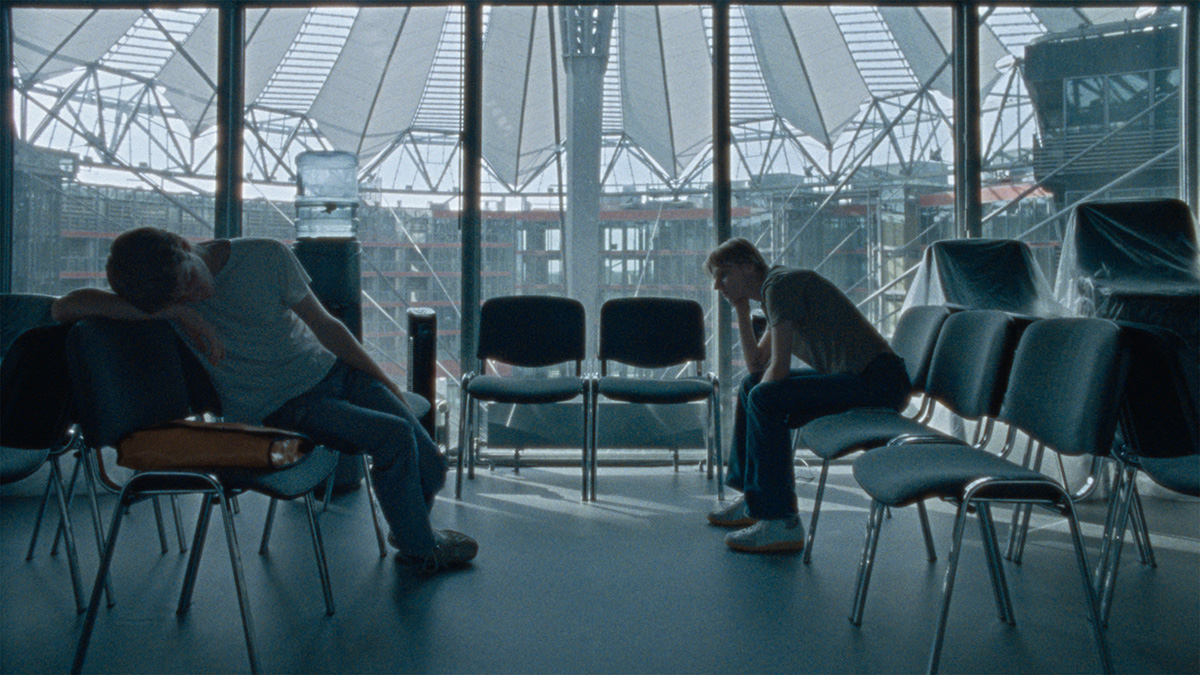
Pierre-Jean Giloux brings to life the spectre of the city of Dholera, the ghost of an abandoned urban project in a desert region of India. Thomas Léon explores the transition between reality and mechanical hallucination by generating an architecture of constantly changing concrete megastructures. Liliia Filina, in an unnamed Eastern European city where everything familiar becomes a landscape of fear, films young people in a state of despair, caught between silent resistance and passive complicity, as their country descends into war. Melanie Manchot films a disused tower that once housed secret military equipment and scrutinises the alpine landscape as a space of complex interactions between humans and nature. In a swampy region of Florida, Susanna Wallin explores an empty house, which becomes an unsolvable enigma. Niklas Buescher fictionalises Berlin's Sony Centre, which seems to be a perpetual construction site, already worn out, where exhausted people cross paths. Gerard & Kelly imagine Eileen Gray spending her last moments in the house she designed and built. Her solitude interrupted by the arrival of old friends, she struggles not to drown in the past.
Forum
Studio Bastille
2 ter Place de la Bastille - 75012 Paris / Metro: Bastille, lines 1, 5 and 7
Free admission for all, subject to availability
Professional accreditation and youth badges: free priority access subject to availability
Panel discussion
"Will Museums and Contemporary Art Centres Disappear?"
Three museum curators are invited to discuss their curatorial practices and share their experiences and perspectives.
Participants :
– Christophe Galois - Curator, Head of Exhibitions - Mudam Musée d’Art Moderne Grand-Duc Jean, Luxembourg.
– Jonathan Pouthier - Curator at the National Museum of Modern Art - Centre Pompidou, responsible for programming the film collection, Paris, France.
– Valentine Umansky - Curator - International Art, Tate Modern, Londres, Royaume Uni.
Moderation:
Nathalie Hénon / Jean-François Rettig – Directors of Rencontres internationales Paris/Berlin
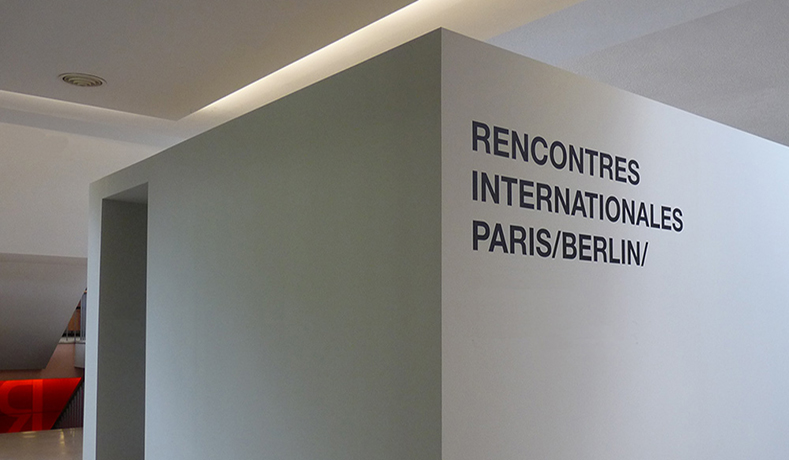
The title given to this panel discussion, ‘Will museums and art centres disappear?’, is deliberately somewhat provocative, but above all calls for reflection on the reasons why these places remain more necessary and significant than ever.
So, while Ito Steyerl asked in 2013 ‘Is the Museum a Battlefield?’ and identified the museum as an essential place for critical articulation in our contemporary societies, isn't it more likely that, in the decades to come, museums and contemporary art venues will be nothing more than fields of ruins? At a time when our era is marked by a plurality of crises – democratic, climatic, ecological – and by the rise of populism and the far right, which tend to instrumentalise culture by reducing it to a partisan function dissociated from the common good, a central question arises: will places of contemporary art and culture still have meaning in a world marked by these collapses? The answer is undoubtedly yes, but it requires us to re-examine the conditions of their necessity, their stakes and their relevance.
One of the guiding ideas of this year's Rencontres Internationales Paris/Berlin is what Roland Barthes expressed in his inaugural address at the Collège de France in 1977, entitled "How to Live Together: Novelistic Simulations of Some Everyday Spaces". There, he explores the possibility of a singular form of sociability, in which the independence of the individual coexists with a sense of collective belonging — the dream of a life both free and shared, without alienation from a discourse. Barthes described this perspective as utopian, but the tension it expresses remains at the heart of our questions: how can we make art venues critical and hospitable spaces, capable of articulating both autonomy and the common?
It is this tension that we would like to explore with the participants, focusing on their practices, experiences and perspectives, aiming to share a common reflection on the future of contemporary art venues.
Special screening
Cité internationale des arts
18 rue de l'Hôtel de Ville - 75004 Paris / Metro: Pont Marie, line 7 / Saint Paul, line 1
Free admission for all, subject to availability
Professional accreditation and youth badges: free priority access subject to availability
Carte blanche to Antoni Muntadas, "Political Advertisement XI (1952-2024)"
For his carte blanche, Antoni Muntadas chose to screen Political Advertisement XI (1952–2024), co-directed with Marshall Reese.
In thepresence of Antoni MuntadasAntoni Muntadas, Marshall Reese : Political Advertisement XI (1952-2024) | Exp. documentary | hdv | colour and b&w | 1:38:00 | Spain, USA | 2024
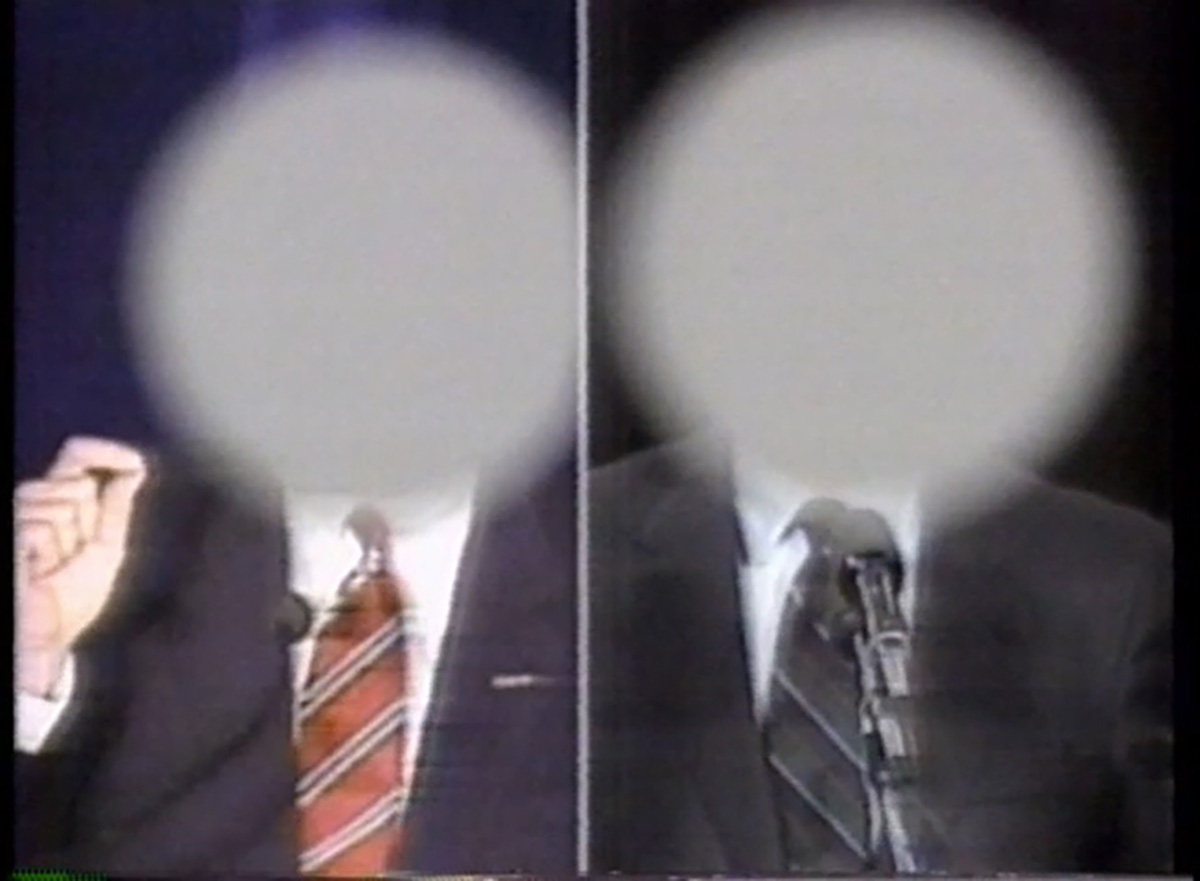
Antoni Muntadas, known for his critical exploration of communication, power and the media, is one of the leading figures in the contemporary art scene. His approach can be linked to the post-conceptual movement, with works – videos, installations, public interventions, texts, etc. – that address social and political issues and challenge the perception of information. Political Advertisement XI (1952-2024), co-directed with Marshall Reese, illustrates the evolution of advertising strategies in US presidential campaigns, with the media's exploitation of fear, prejudice and emotions, taking a critical look at the role of the media in politics and its effects on democracy, and resonating strongly with current political events and the rise of extremism.
Screening
Cité internationale des arts
18 rue de l'Hôtel de Ville - 75004 Paris / Metro: Pont Marie, line 7 / Saint Paul, line 1
Free admission for all, subject to availability
Professional accreditation and youth badges: free priority access subject to availability
"A.I. Capital"
Aurèle Ferrier : Claws - Experimental doc. | 4k | color | 18:27 | Switzerland, China | 2025
Aurèle Ferrier
Claws
Experimental doc. | 4k | color | 18:27 | Switzerland, China | 2025
CLAWS is a moving-image essay of gliding takes through rapidly expanding cities, drifting from peripheral terrains into dense cores before opening back to the horizon. In largely unpopulated frames, architecture, materials and sound turn urban expansion into a field of perception—where geometry persists, intention falters, and the land remembers.
Aurèle Ferrier is a Swiss visual artist working with film, exploring built environments and urban peripheries. CLAWS concludes his trilogy on human-made landscapes. His moving-image works have been shown at the Hiroshima City Museum of Contemporary Art (Hiroshima), IDFA (Amsterdam), Rencontres Internationales (Paris/Berlin), Open City Documentary Festival (London), Anthology Film Archives (New York) and Image Forum (Tokyo).
Moritz Frei : Am I The Sleeping Bag Of My Soul? - Experimental film | mp4 | color | 3:53 | Germany | 2025
Moritz Frei
Am I the sleeping bag of my soul?
Experimental film | mp4 | color | 3:53 | Germany | 2025
Clowns at a flooded piano, eerie stockbrokers, cardboard fountains in urban spaces. Without a clear narrative structure, the boundaries between self, body and consciousness become blurred. Familiar signs appear alienated, spaces dissolve, meanings remain elusive. Despite its abstraction, the film seems strangely connected to our present. It is as if it were uncovering a deeper unease beneath the surface of everyday images, one that is difficult to name but remains palpable.
Moritz Frei is a visual artist who works with installation, video, text and sound. His practice moves between analysis and absurdity, using humour as a strategy to question social and media structures. Experimentation and possible failure are integral parts of his artistic process, allowing him to playfully explore control mechanisms and perception. Frei studied at the Academy of Visual Arts in Leipzig. For many years, he worked part-time in video stores, the Filmgalerie 451 Berlin and Alpha 60 Leipzig, both renowned centres for experimental and international cinema. This experience sharpened his eye for the materiality and power of moving images. The initial moment for his artistic and cinematic work was Moritz Frei's first cup of coffee with Bruno Ganz for his film ‘Meine erste Tasse Kaffee’ (My first Cup of Coffee).
Michael Dietrich : Zone Of Silence (scream Machine) - Experimental film | hdv | color | 9:30 | Austria | 2025
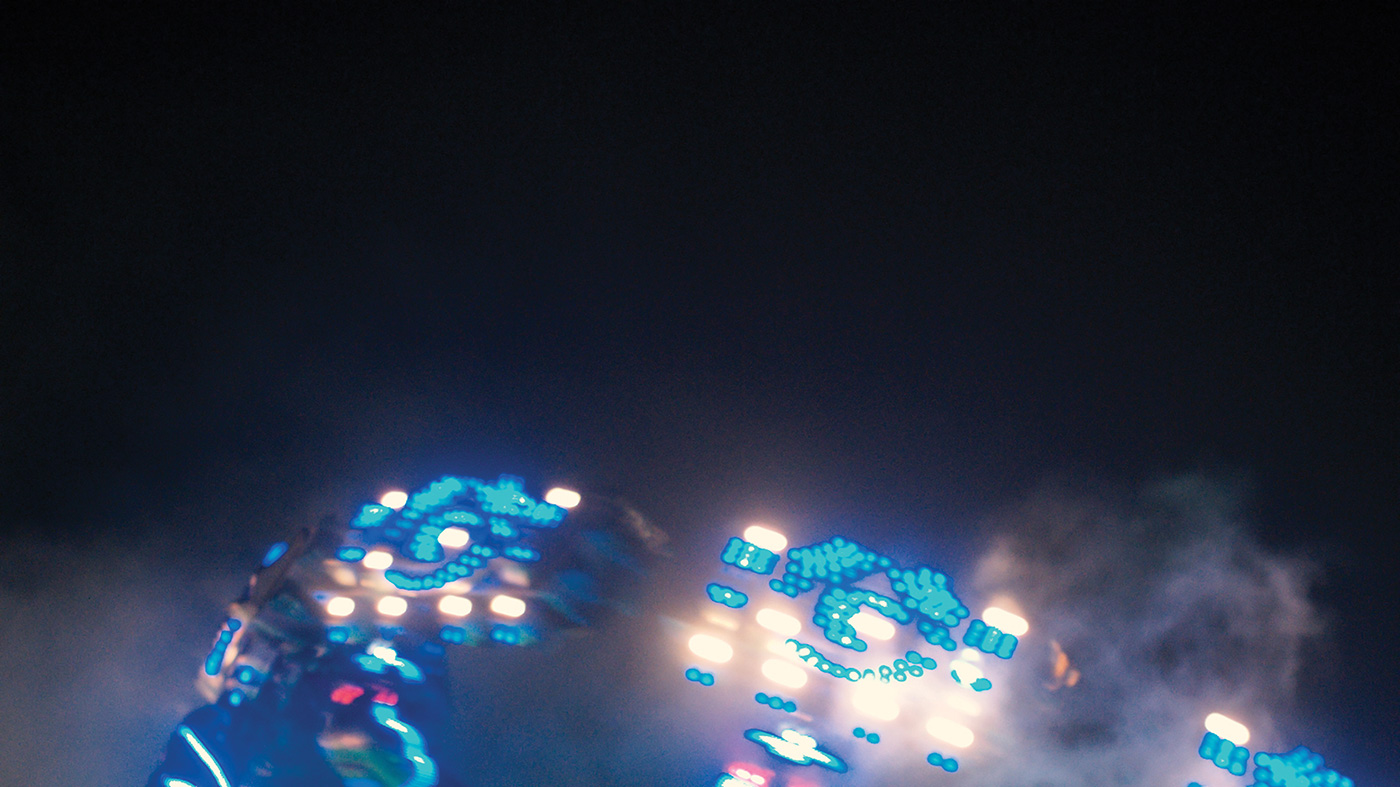
Michael Dietrich
zone of silence (scream machine)
Experimental film | hdv | color | 9:30 | Austria | 2025
The experimental film Zone of Silence (Scream Machine) explores the interplay between light, fog, and resonance to depict inner isolation and psychological disorientation. The city is enveloped in a dense atmosphere, while reflections of light and muffled sounds create a “zone of silence” in which orientation and communication begin to dissolve. Inspired by historical maritime navigation problems—where foghorns became inaudible under certain weather conditions—the film translates this phenomenon into the realm of the human unconscious. Theodor Reik’s psychoanalytic concept of the “zone of silence” serves as a central motif for repressed emotions and the difficulty of breaking through them. The closing sequence shows the fading inscription “EUROPA,” a bleak reflection on the continent’s political future. Through its dense atmosphere, a composition blending field recordings and synthesized sound, and the use of visual metaphors, the film offers a profound exploration of inner emptiness and the search for orientation.
Michael Dietrich (*1985, Vienna, Austria)studied social design at the HfbK Hamburg and Photography at the Academy of Fine Arts Vienna. His work explores the impact of human intervention on nature, often unfolding unsettling scenarios through video and acousmatic.
David Kelley : African Union - Experimental film | mp4 | color | 4:4 | USA | 2025
David Kelley
African Union
Experimental film | mp4 | color | 4:4 | USA | 2025
African Union responds to 2018 reports of Chinese surveillance at the African Union Headquarters in Addis Ababa. Made with generative AI, commercial stock imagery, and documentary footage, the film explores digital imperialism, data extraction, and the ideological entanglements of AI within the evolving dynamics of China–Africa political and technological relations.
David Kelley’s work traces the hidden ecologies of global infrastructure—from deep-sea mining and the Silk Road to Alberta’s oil sands and the extraction of rare earth elements in China. Working across film, photography, installation, and sculpture, he explores how technology, modernity, ecology, and memory operate as interwoven systems of mediation. His practice draws on essay film, experimental ethnography, and experimental theater, using form as a site for affective experience, ambiguity, and transgression. Kelley approaches research as an aesthetic process, privileging sensorial and speculative modes over purely discursive ones. His projects often involve site-specific production, archival research, and the integration of everyday objects and theatrical constructions within immersive environments. Scientific specimens—borrowed from natural history collections or reimagined in glass, ceramic, and stone—anchor his installations in material history while opening space for surreal and speculative encounters. His work has been exhibited internationally at the Museum of Modern Art, New York; Rencontres Internationales Paris/Berlin; and The Bank, Shanghai. Upcoming presentations include LACMA in Los Angeles and the Global Visions FotoFest Biennial 2026 in Houston. Kelley holds an MFA from UC Irvine and was a 2010–11 Whitney Independent Study Program fellow.
Stéphane Degoutin, Gwenola Wagon : Apple - Experimental film | mov | color | 4:0 | France | 2025
Stéphane Degoutin, Gwenola Wagon
Apple
Experimental film | mov | color | 4:0 | France | 2025
Everything is Real shows the reddest apples, the greenest call centers, the server rooms with the most cables, the smiliest employees, the delivery drivers with their most beautiful parcels, the most efficient volunteers, the biggest mountains of waste - but pushes them to the extreme of stereotyping: insensitively, stereotypes go to extremes.
Stéphane Degoutin is an artist and researcher. His work explores “dark systems,” the structures that often go unnoticed yet organize our lives: from air conditioning to international airports, from music for houseplants to urban infrastructures. He undertakes a form of reverse engineering of these hidden logics, in order to imagine other ways of thinking and acting. Gwenola Wagon is an artist and researcher. She is a University Professor and teaches at the Sorbonne School of Arts at Paris 1 University. Through installations, films, performances and books, she imagines alternative and paradoxical narratives for thinking about the contemporary digital world.
Soren Thilo Funder : Mirror Touch (archipelago Dlc_01) - Fiction | 4k | color | 19:21 | Denmark | 2024
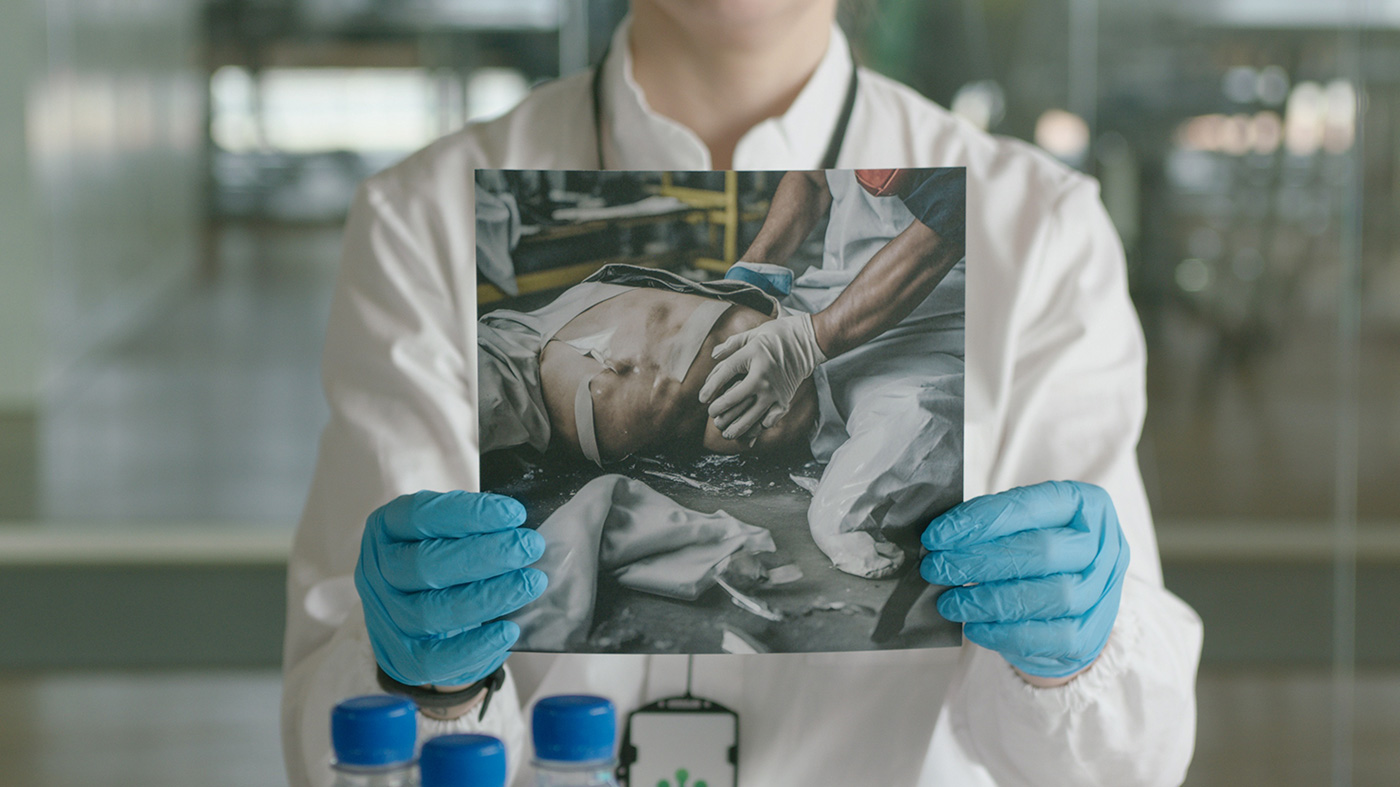
Soren Thilo Funder
Mirror Touch (Archipelago DLC_01)
Fiction | 4k | color | 19:21 | Denmark | 2024
Mirror-touch synesthesia" is a neurological phenomenon where a person feels the same touch as they see another person experiencing. Stimuli on one sense thus trigger a feeling in another. In the video work ’Mirror Touch (Archipelago DLC_01)’, employees at the high-frequency trading company Archipelago™ are subjected to a series of experimental tests in the development of synthetic empathy. The process aims to reunite the body's space with the cognitive; the corporeal with the immaterial; the real with the imaginary. Accompanied by the film's actors, the viewer is led by a commanding voice on a suggestive journey from the trading terminals to the physical reality of the factory. Here, we are reminded of the factory floor's still indisputable and violent physical reality and the worker's body as a physical witness to the violent imprint of progress.
Søren Thilo Funder is a visual artist working primarily with video and installation. His works are mash-ups of popular fictions, cultural tropes and socio-political situations, projections and histories. They are narrative constructions that insist on new meaning being formed in the thin membrane separating fictions from realities. Invested in written and unwritten histories, the paradoxes of societal engagement, temporal displacements and a need for new nonlinear narratives, Thilo Funder proposes spaces for awry temporal, political and recollective encounters.
Bart Groenendaal : Sensitivity - Fiction | hdv | color | 10:18 | Netherlands | 2024
Bart Groenendaal
Sensitivity
Fiction | hdv | color | 10:18 | Netherlands | 2024
A young woman wanders around a business district at night and at dawn meets seven lonely strangers, who each fall under the thrall of her energy. Inspired by the imagery of the Flemish Primitives and made in collaboration with a real-life quantum-healer, the film is a musing on the longing for connection in a neoliberal urban context.
In short narrative films, documentary and installation work, Bart Groenendaal (Amsterdam, 1975) explores how the cinema shapes our social subjectivity and the world around us as an ever fluctuating expression of ideology.
Zachary Epcar : Sinking Feeling - Experimental fiction | 16mm | color | 20:0 | USA | 2024
Zachary Epcar
Sinking Feeling
Experimental fiction | 16mm | color | 20:0 | USA | 2024
Three white collar commuters recall an experience of getting trapped on a train in San Francisco's transbay tunnel, each drifting into fantasies of sex, death, and other intimacies with strangers. "A beguiling, spacious, and transportive work of suspended tension, that looks for new forms of intimacy in the antiseptic. An urban office park becomes a reflecting pool for the erotic fantasies of a derailed train where we wait, shake and survive together.” - 25 FPS grand jury
Zachary Epcar (b. San Francisco) is a filmmaker whose work has screened at the international film festivals of Toronto, New York, Rotterdam, San Francisco, Vancouver, Edinburgh, and Melbourne; Berkeley Art Museum & Pacific Film Archive, Media City, IndieLisboa, European Media Art Festival, EXiS, 25 FPS; and in solo screenings at the Museum of Contemporary Art Chicago, Museum of the Moving Image, and Black Hole Cinematheque. His films have been featured online on MUBI, Le Cinéma Club, and Ecstatic Static. Zachary lives in Oakland, California where he is a member of the film programming collective Light Field. His films are distributed by Light Cone (Paris).
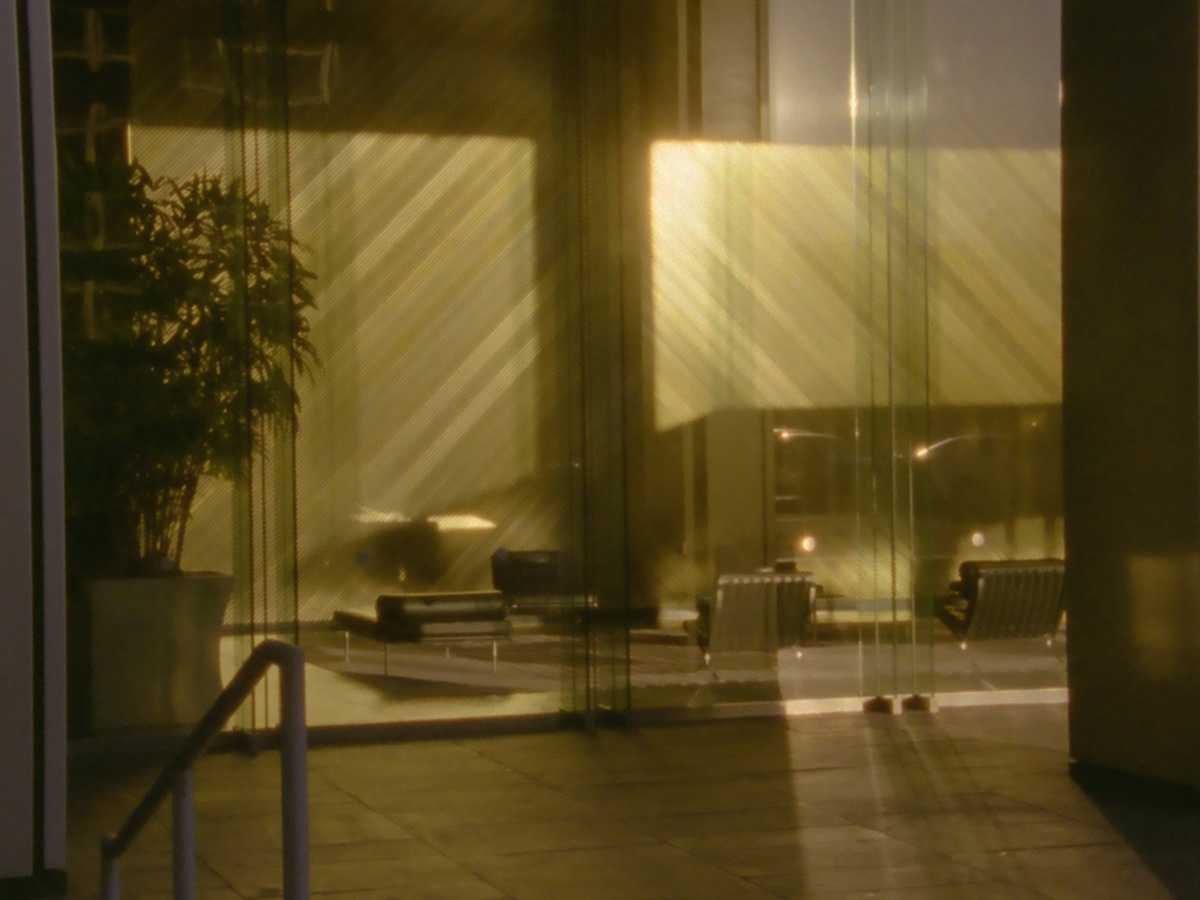
Aurèle Ferrier traverses landscapes and investigates how human intention is inscribed in space. Moritz Frei explores the mechanisms of control in the staged turmoil of our era, in the age of artificial intelligence. The boundaries between the self, the body and consciousness become blurred. Michael Dietrich creates a zone of silence in a twilight landscape, inspired by maritime navigation. David Kelley revisits Chinese surveillance at the African Union headquarters in Addis Ababa and explores, via AI and archives, digital imperialism and geopolitical issues. Stéphane Degoutin and Gwenola Wagon offer a paroxysmal vision of stereotypes: imperceptibly, stereotypes are becoming extreme. Soren Thilo Funder films the employees of a high-frequency trading company, subjected to experimental tests aimed at developing synthetic empathy. Bart Groenendaal follows a young woman wandering through a business district at dawn. Zachary Epcar contrasts the human body with architecture in the non-places of contemporary offices to reveal an anxious post-modernity where repressed desires and invisible tensions emerge.